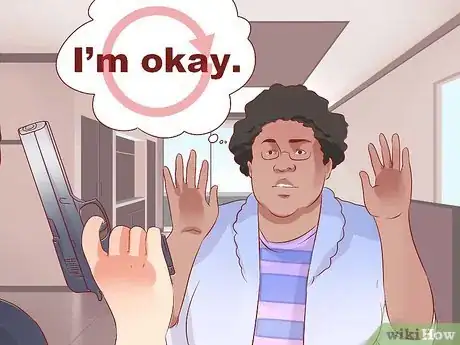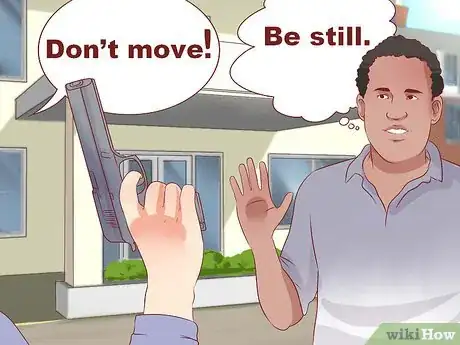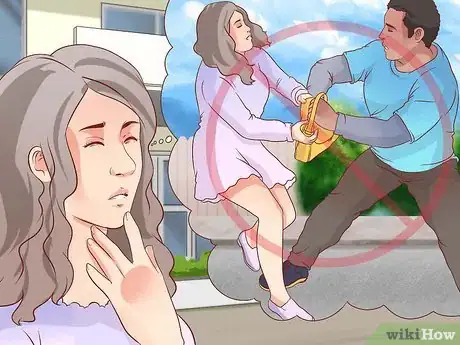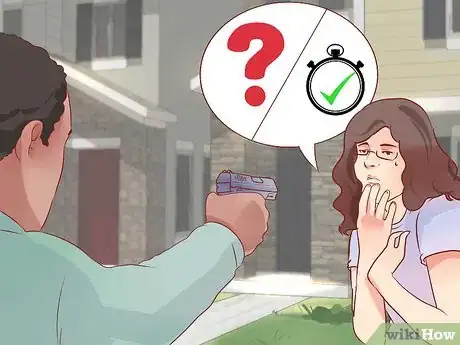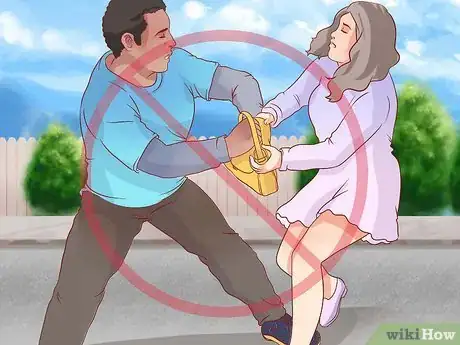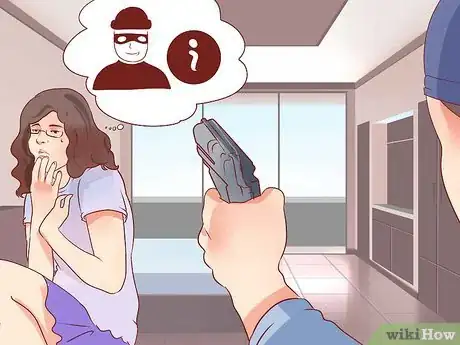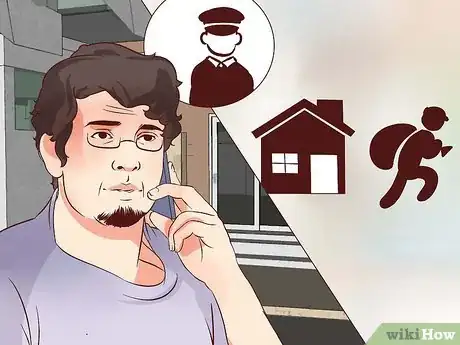This article was co-authored by Saul Jaeger, MS and by wikiHow staff writer, Janice Tieperman. Saul Jaeger is a Police Officer and Captain of the Mountain View, California Police Department (MVPD). Saul has over 17 years of experience as a patrol officer, field training officer, traffic officer, detective, hostage negotiator, and as the traffic unit’s sergeant and Public Information Officer for the MVPD. At the MVPD, in addition to commanding the Field Operations Division, Saul has also led the Communications Center (dispatch) and the Crisis Negotiation Team. He earned an MS in Emergency Services Management from the California State University, Long Beach in 2008 and a BS in Administration of Justice from the University of Phoenix in 2006. He also earned a Corporate Innovation LEAD Certificate from the Stanford University Graduate School of Business in 2018.
wikiHow marks an article as reader-approved once it receives enough positive feedback. In this case, 89% of readers who voted found the article helpful, earning it our reader-approved status.
This article has been viewed 167,889 times.
Hopefully you will never find yourself in a position where you have to deal with an armed robbery. Robberies can be stressful and dangerous situations for anyone involved, even those who have had training. However, staying calm and collected can help you survive the ordeal and help you to work with law enforcement, later on, to bring the robber to justice.
Steps
Staying Calm
-
1Repeat calming phrases to yourself. You can help yourself to remain calm during a robbery by repeating certain calming phrases to yourself. These phrases should definitely be positive ones that remind you to stay relaxed, be confident that you will be alright, and that you can and will survive this situation. Never be negative about the situation. It will only make things worse.
- Remind yourself to stay relaxed, quiet and in control of yourself. This will also help you to clearly see the robber's traits, so you can describe him to the police after.
- Tell yourself that you are brave and will be able to make it through the robbery.
- Try thinking something like “I'm okay. I will survive this. I am brave enough to make it through this.”
-
2Try some relaxation techniques. Although it may be difficult during a robbery, relaxation techniques can help you to reduce the effects of panic. If you are able to perform some of these techniques during the robbery they can help keep you calm through the ordeal.[1]
- Tense a muscle for a few seconds and then relax it. Do this for each muscle group in your body.
- Visualize a safe and relaxing space in your mind that you can escape to. Try to use all of your senses when imagining this place.
- Focus directly on feeling your heart rate lowering, your breathing slowing, and your body relaxing.
Advertisement -
3Rephrase the robber's commands into positive statements. The robber may yell commands at you and these can result in you feeling fear, panic and distress. However, you can rephrase these commands into more positive statements that you have selected. Thinking in this way and can help keep you calm and give you the sense that you have some control in the situation.
- Rephrase these commands internally, inside your own head. Do not speak these commands out loud.
- ”Don't move!” can be rephrased as “Be still”.
- ”Don't look!” can be rephrased as “Look at something else.”
-
4Realize that staying calm keeps you safe. Generally a robber is only looking for money. You can help keep yourself calm by reminding yourself that the more relaxed, quiet, and compliant you stay the less likely you are to come to any harm during the robbery.
Taking The Right Actions
-
1Cooperate. During a robbery it is important to demonstrate that you are not a threat or obstacle to the robber. A good way to convey this is to remain calm and cooperate with the robber. Work with the robber's commands to help keep both yourself and everyone else as safe as can be during the robbery. [2]
- Do not offer to volunteer or actively help the robber. Only do what they ask of you.
- Listen carefully to commands and work quickly and effectively to fulfill them.
- Inform the robber directly about any steps you need to take and explain why you are doing them.
- Ask them permission for any actions like putting your hands in a drawer or your pockets before doing so.
EXPERT TIPSaul Jaeger is a Police Officer and Captain of the Mountain View, California Police Department (MVPD). Saul has over 17 years of experience as a patrol officer, field training officer, traffic officer, detective, hostage negotiator, and as the traffic unit’s sergeant and Public Information Officer for the MVPD. At the MVPD, in addition to commanding the Field Operations Division, Saul has also led the Communications Center (dispatch) and the Crisis Negotiation Team. He earned an MS in Emergency Services Management from the California State University, Long Beach in 2008 and a BS in Administration of Justice from the University of Phoenix in 2006. He also earned a Corporate Innovation LEAD Certificate from the Stanford University Graduate School of Business in 2018.Police Captain, Mountain View Police Department
 Saul Jaeger, MS
Saul Jaeger, MS
Police Captain, Mountain View Police DepartmentOur Expert Agrees: If you're being robbed, don't fight. The person might be carrying a weapon, on drugs, or mentally unstable, and there's nothing you have that's worth your life. Your computer, your phone, and your money can all be replaced, but you can't. Just give them what they want and get away, then report the crime to the police immediately.
-
2Ask for clarification in the right way. If you are given a command by the robber and you don't understand what they are asking, you may need to ask for clarification. Doing so can be dangerous as the robber is likely to be highly agitated and nervous. Try asking a question using some of the following techniques to make sure you keep the situation as calm as can be:[3]
- Keep your question direct and short. Saying something like “I'm sorry. I don't understand.” can be simple enough and still get your intention across.
- If you misheard something try rephrasing what you thought you heard as a question. For example “You wanted only 10 dollar bills?”
- You should ask for permission before doing anything that might alarm the robber. For example “I must reach under the counter to get the keys. Is this okay?”
- Never ask any questions that are not relevant to your own confusion about what the robber was asking.
-
3Speak directly and only if required. Normally during the course of a robbery you should remain as silent as you can. However, there may be a time when the robbery asks you a question that requires a response from you. Speaking honestly and directly can help keep you stay calm in your response.
- Long responses during a robbery can increase stress and panic.
- Try to frame responses in a positive way, working with the robber and showing compliance.
- Always answer honestly.
- Never try to change the robbers mind.
- For example, if you are asked where money might be located and how to access it, you might reply “In the safe. It's here behind the counter”. Don't go into any more detail about the money or safe unless asked.
-
4Do not fight the robber or offer resistance. Robbers do not want a fight. Fighting will only get you and possibly other people hurt or killed. Remain calm throughout the robbery and do not try to put and end to it by fighting the robbers or trying to get in their way.[4]
- Move slowly and calmly. Quick movements may appear threatening to the robber.
-
5Take note of as many details as you can. Keeping track of details regarding the robber and the robbery can be of use to police and can also help to keep your mind focused and calm. Pay careful attention to details about both the robber and what the robber did during the crime to help keep you relaxed.[5]
- Remember what the robber looked liked. Take mental notes of height, weight, clothes, or other distinguishing aspects.
- Remember what the robber did. Keep a mental record of everything the robber did and in what order.
- Don't stare or make eye contact with the robber. Take quick glances only.
- Don't go out of your way to take in the details as this can put you in danger.
-
6Call the police and lock all doors after the robber leaves. Immediately after the robber leaves lock all doors and windows and contact law enforcement to report your situation. Locking doors and windows will help keep the robber from returning as well as preserve the crime scene for when law enforcement arrives.[6]
- Work with law enforcement to explain the details of the robbery that you recall.
- Talk with others at the crime scene to help keep you calm and recall details about the robbery.
- Do not touch anything in the area as police will need to investigate it.
- Check the condition of those present once the doors and windows have been secured.
Warnings
- Do not argue or speak more than you must with the robber.⧼thumbs_response⧽
- Do not make any fast or sudden movements.⧼thumbs_response⧽
- Do not make eye contact with a robber.⧼thumbs_response⧽
- Do not fight back during a robbery.⧼thumbs_response⧽
- Do not attempt to pursue the robber after they leave you alone.⧼thumbs_response⧽
References
- ↑ http://www.mayoclinic.org/healthy-lifestyle/stress-management/in-depth/relaxation-technique/art-20045368?pg=2
- ↑ https://dps.usc.edu/safety-tips/suspicious-activity/robbery/
- ↑ https://dps.usc.edu/safety-tips/suspicious-activity/robbery/
- ↑ https://dps.usc.edu/safety-tips/suspicious-activity/robbery/
- ↑ https://www.portlandoregon.gov/police/article/31555
- ↑ https://www.portlandoregon.gov/police/article/31555
